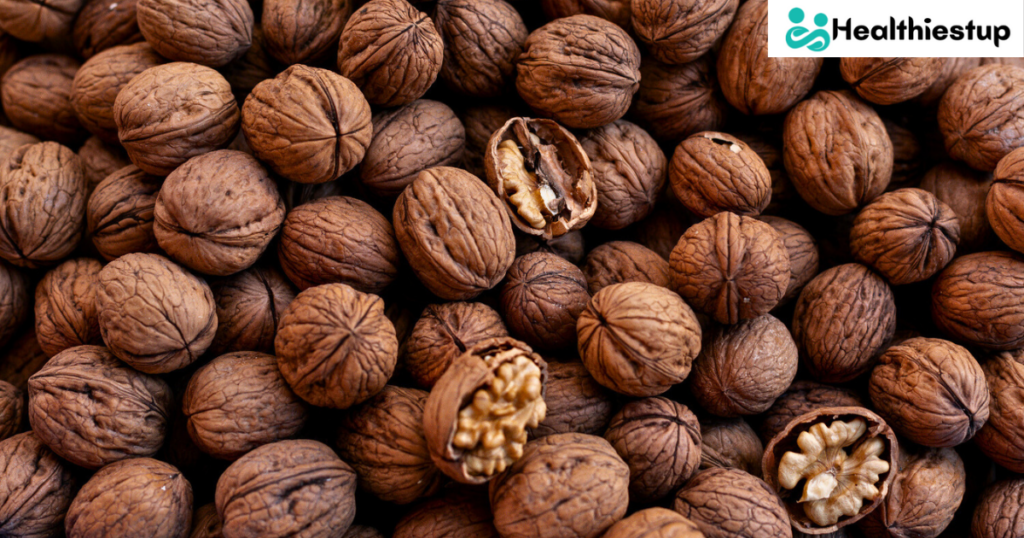Introduction
Health benefits of walnuts: Walnuts are one of the most nutrient-dense nuts, often referred to as a “brain food” due to their unique shape and impressive health benefits. Packed with healthy fats, proteins, and essential nutrients, walnuts have been a staple in diets for centuries. Whether consumed raw, roasted, or as part of various dishes, they offer numerous health advantages.
In this article, we’ll explore the incredible benefits of walnuts, from boosting brain function to supporting heart health and aiding in weight management. Let’s dive into the science behind why walnuts should be a part of your daily diet.
1. Nutritional Profile of Walnuts
Walnuts are not just a tasty snack they are a powerhouse of nutrients. They contain:
- Healthy fats: Rich in polyunsaturated fats, including Omega-3 fatty acids
- Protein: A great plant-based protein source
- Fiber: Supports digestion and keeps you full longer
- Vitamins and minerals: High in vitamin E, magnesium, phosphorus, and B vitamins
Compared to other nuts, walnuts stand out due to their high content of alpha-linolenic acid (ALA), a type of Omega-3 fatty acid crucial for brain and heart health. A single serving (about 28 grams or one ounce) provides:
| Nutrient | Amount per 1 oz (28g) serving |
|---|---|
| Calories | 185 kcal |
| Protein | 4.3g |
| Fat | 18.5g |
| Carbs | 3.9g |
| Fiber | 1.9g |
Including walnuts in your diet ensures you receive these essential nutrients, making them a valuable addition to a balanced lifestyle.
2. Walnuts for Heart Health
Health benefits of walnuts: Walnuts play a significant role in promoting cardiovascular health. Here’s how they help:
Lowering Bad Cholesterol (LDL)
- Walnuts contain high levels of Omega-3 fatty acids and polyunsaturated fats that help reduce low-density lipoprotein (LDL), commonly known as bad cholesterol.
- Studies show that regular walnut consumption can lower cholesterol levels by up to 10%.
Reducing Blood Pressure
- The magnesium and potassium in walnuts help relax blood vessels, reducing hypertension.
- Walnuts improve endothelial function, leading to better blood flow and lower blood pressure.
Preventing Heart Disease
- Walnuts contain antioxidants like ellagic acid, which help fight oxidative stress a major contributor to heart disease.
- Eating walnuts regularly has been linked to a 15-20% lower risk of cardiovascular diseases.
To maximize these heart benefits, experts recommend consuming a handful of walnuts daily as part of a balanced diet.
3. Brain-Boosting Benefits of Walnuts

Did you know that walnuts resemble the human brain? It turns out, their shape is more than just a coincidence!
Rich in Omega-3 for Brain Function
- Walnuts are one of the best plant-based sources of Omega-3 fatty acids, which are essential for cognitive function and memory.
- ALA in walnuts helps reduce inflammation in the brain, promoting mental clarity.
Enhancing Memory and Cognitive Skills
- Regular walnut consumption has been linked to improved memory and problem-solving skills.
- Research suggests that older adults who eat walnuts show slower cognitive decline.
Preventing Neurodegenerative Diseases
- Walnuts contain polyphenols and vitamin E, both of which help fight free radicals that cause brain aging.
- Studies indicate that walnuts may lower the risk of Alzheimer’s disease and other forms of dementia.
For optimal brain health, adding walnuts to your daily routine can work wonders!
4. Walnuts and Weight Management
Health benefits of walnuts: If you’re looking to maintain a healthy weight, walnuts can be your best friend.
Healthy Fats for Weight Loss
- Walnuts are packed with good fats that help reduce cravings and prevent overeating.
- Unlike unhealthy fats, the polyunsaturated fats in walnuts boost metabolism and fat-burning.
Keeping You Full Longer
- High fiber and protein content make walnuts a satisfying snack that keeps hunger at bay.
- Studies show that people who consume walnuts regularly tend to eat fewer calories throughout the day.
How to Include Walnuts in a Weight-Loss Diet
- Add them to salads or yogurt for an extra crunch.
- Blend them into smoothies for a protein boost.
- Snack on a small handful between meals to prevent overeating.
Moderation is key about 1 ounce (28 grams) per day is enough to reap the benefits without overloading on calories.
5. Walnuts and Diabetes Management
Health benefits of walnuts; Diabetes is a growing health concern, but walnuts can help manage and even prevent it.
Regulating Blood Sugar Levels
- Walnuts have a low glycemic index, meaning they don’t cause rapid blood sugar spikes.
- Their high fiber content slows digestion, preventing sugar crashes.
Improving Insulin Sensitivity
- Research shows that consuming walnuts can improve insulin function, making it easier for the body to regulate blood sugar.
- Walnuts contain bioactive compounds that help reduce insulin resistance.
Adding walnuts to a diabetes-friendly diet can contribute to better long-term blood sugar control.
6. Walnuts for Gut Health
A healthy gut is essential for overall well-being, and walnuts can play a crucial role in maintaining good digestive health.
Rich in Fiber for Digestive Support
- Walnuts are a great source of dietary fiber, which helps regulate bowel movements and prevent constipation.
- Fiber promotes better digestion and supports a healthy metabolism.
Boosting Gut Microbiota
- Research has shown that walnuts help increase beneficial gut bacteria, such as Lactobacillus and Bifidobacterium.
- These bacteria play a key role in digestion, immune function, and even mental health.
Preventing Digestive Issues
- Regular walnut consumption can reduce the risk of inflammatory bowel diseases (IBD) like Crohn’s disease and ulcerative colitis.
- The antioxidants and polyphenols in walnuts help reduce gut inflammation.
For a happy gut, consider adding walnuts to your diet in salads, smoothies, or oatmeal.
7. Walnuts and Anti-Inflammatory Properties

Chronic inflammation is linked to numerous diseases, including arthritis, heart disease, and cancer. Walnuts are packed with compounds that help fight inflammation naturally.
Reducing Inflammation in the Body
- Walnuts contain polyphenols, a type of antioxidant that reduces oxidative stress and inflammation.
- Omega-3 fatty acids in walnuts further help decrease inflammation markers in the body.
Fighting Chronic Diseases
- Inflammation is a key factor in conditions like diabetes, obesity, and Alzheimer’s disease.
- Regular walnut consumption has been shown to lower inflammation-related risks in these diseases.
Supporting Joint and Muscle Health
- The anti-inflammatory properties of walnuts can help people with arthritis and joint pain.
- Magnesium and Omega-3s in walnuts support muscle recovery and reduce soreness after exercise.
Eating walnuts daily can be a natural way to reduce inflammation and maintain overall health.
8. Skin and Hair Benefits of Walnuts

Health benefits of walnuts: Walnuts are not only good for internal health but also for glowing skin and strong hair.
Promoting Radiant Skin
- Walnuts contain vitamin E and antioxidants, which help protect skin cells from damage.
- They help fight premature aging by reducing wrinkles and keeping skin hydrated.
Boosting Hair Growth and Strength
- Omega-3 fatty acids and biotin in walnuts strengthen hair follicles and promote Hair growth.
- Regular walnut consumption can prevent hair thinning and scalp dryness.
Using Walnut Oil for Beauty Benefits
- Walnut oil can be applied to the skin to reduce dark circles and wrinkles.
- Massaging walnut oil into the scalp can improve hair texture and reduce dandruff.
To enhance skin and hair health, try incorporating walnuts into your meals or using walnut oil for topical application.
9. Walnuts and Cancer Prevention
Health benefits of walnuts: One of the most powerful benefits of walnuts is their potential role in cancer prevention.
Rich in Antioxidants
- Walnuts contain high amounts of ellagic acid, polyphenols, and vitamin E, which help fight free radicals.
- These compounds reduce oxidative stress, which is a leading cause of cancer.
Fighting Different Types of Cancer
- Studies suggest that regular walnut consumption may lower the risk of breast, prostate, and colon cancer.
- Walnuts contain bioactive compounds that help slow tumor growth.
Supporting the Immune System
- The nutrients in walnuts, including zinc and selenium, boost immunity and help the body fight cancerous cells.
Though not a cure, including walnuts in a balanced diet can be a step toward cancer prevention.
10. Walnuts and Bone Health
Health benefits of walnuts: Strong bones are essential for mobility and overall health, and walnuts provide several bone-strengthening nutrients.
Rich in Magnesium and Phosphorus
- These minerals are crucial for maintaining bone density and preventing fractures.
- Walnuts also help in calcium absorption, which is essential for bone strength.
Preventing Osteoporosis
- Regular walnut consumption can reduce the risk of osteoporosis, a condition that weakens bones.
- The anti-inflammatory properties of walnuts also help in maintaining bone health.
Strengthening Joints
- Walnuts’ Omega-3 fatty acids help lubricate joints and reduce pain, especially in arthritis patients.
For strong and healthy bones, adding walnuts to your daily diet can be beneficial.
11. Walnuts and Sleep Quality
Health benefits of walnuts: Struggling with sleep? Walnuts might be the natural remedy you need!
Natural Source of Melatonin
- Walnuts contain melatonin, a hormone that regulates sleep patterns.
- Eating walnuts in the evening can help improve sleep quality and duration.
Supporting Relaxation and Stress Reduction
- Walnuts are rich in magnesium, which helps relax muscles and reduce stress.
- They can also improve serotonin levels, promoting a calmer mind before bedtime.
Best Ways to Consume Walnuts for Better Sleep
- Eat a handful of walnuts an hour before bed.
- Add walnuts to warm milk or yogurt for a soothing nighttime snack.
If you have trouble sleeping, consider adding walnuts to your diet to improve sleep quality.
12. Walnuts for Pregnancy and Child Development
Health benefits of walnuts: Pregnant women and growing children can benefit greatly from walnuts due to their rich nutrient profile.
Supporting Fetal Brain Development
- Omega-3 fatty acids in walnuts are essential for the baby’s brain growth and cognitive development.
- Walnuts also contain folic acid, which helps prevent birth defects.
Providing Essential Nutrients During Pregnancy
- Walnuts are packed with iron, protein, and fiber, all crucial for a healthy pregnancy.
- They help in reducing pregnancy-related constipation and promoting overall well-being.
Boosting Child Growth and Immunity
- Including walnuts in a child’s diet can support brain function and improve learning abilities.
- The nutrients in walnuts also strengthen the immune system and protect against infections.
For expecting mothers and young children, walnuts are a superfood that provides numerous health benefits.
13. Different Ways to Include Walnuts in Your Diet
Health benefits of walnuts: Not sure how to eat walnuts? Here are some tasty and easy ways to enjoy them:
Raw vs. Roasted Walnuts
- Raw walnuts retain the most nutrients, while roasted ones have a crunchier texture.
- Avoid overly salted or flavored walnuts to keep them healthy.
Adding Walnuts to Meals and Snacks
- Sprinkle walnuts on salads, yogurt, or oatmeal.
- Blend them into smoothies for extra protein and healthy fats.
- Use walnuts in baked goods like muffins or banana bread.
Delicious Walnut-Based Recipes
- Make walnut butter as a healthy alternative to peanut butter.
- Add crushed walnuts to pesto sauce for extra flavor.
- Use ground walnuts as a crunchy coating for chicken or fish.
There are endless ways to enjoy walnuts get creative with your meals!
14. Potential Side Effects and Precautions
Health benefits of walnuts: While walnuts are packed with benefits, they should be consumed in moderation.
Possible Allergies and Reactions
- Some people may be allergic to walnuts, leading to symptoms like swelling, itching, or difficulty breathing.
- If you have a nut allergy, consult a doctor before eating walnuts.
Effects of Overconsumption
- Eating too many walnuts can lead to digestive issues like bloating or diarrhea.
- Walnuts are calorie-dense, so excessive consumption may contribute to weight gain.
How to Eat Walnuts in Moderation
- Stick to a daily serving of about 1 ounce (28 grams).
- Balance walnut intake with other healthy foods for a well-rounded diet.
Conclusion
Health benefits of walnuts: Walnuts are a powerhouse of nutrients, offering numerous health benefits ranging from heart and brain health to weight management and cancer prevention. Their rich content of Omega-3 fatty acids, antioxidants, and essential vitamins makes them a valuable addition to any diet.
By incorporating walnuts into your meals and snacks, you can enjoy their health advantages while keeping your diet delicious and diverse. So, why not grab a handful of walnuts today and start reaping the benefits?
FAQs
- How many walnuts should I eat daily?
A handful (about 1 ounce or 7-8 walnuts) is recommended for optimal health benefits. - Are walnuts better raw or roasted?
Raw walnuts retain the most nutrients, while roasted ones add extra crunch and flavor. - Can walnuts help with anxiety and stress?
Yes, walnuts contain magnesium and Omega-3s, which help reduce stress and improve mood. - Are walnuts safe for people with diabetes?
Absolutely! Walnuts help regulate blood sugar levels and improve insulin sensitivity. - Can walnuts improve hair and skin health?
Yes, their vitamin E and Omega-3 content nourish the skin and strengthen hair.



